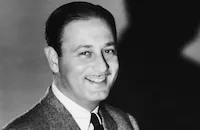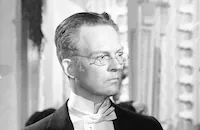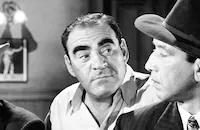Show Business

Brief Synopsis
Cast & Crew
Edwin L. Marin
Eddie Cantor
George Murphy
Joan Davis
Nancy Kelly
Constance Moore
Film Details
Technical Specs

Synopsis
In 1914, hoofer George Doane meets Eddie Martin at the Miner's Bowery Theatre when Eddie performs in an amateur contest. When the audience begins to heckle Eddie, George offers encouragement and stage directions from the wings. As a result of George's coaching, Eddie wins first prize, and George invites him to celebrate at Kelly's Café, a gathering place for entertainers. At the café, the womanizing George notices Constance Ford, who is sitting with her sister, Joan Mason, and their agent, Charlie Lucas. After introducing himself to Connie, George begins to dance with her to the tune of "It Had to Be You." They are interrupted by the appearance of Nancy Gaye, George's jealous girl friend, who insists that he leave with her. That night, George invites Eddie to join his burlesque act, and at the end of the season on the road, George decides to ditch Nancy in Maine while he goes to New York to look for Connie. In New York, George and Eddie return to the café, where they meet Connie, Joan and Charlie. When George asks Charlie about breaking into vaudeville, Charlie discourages him until Connie suggests combining her and Joan's sister act with George and Eddie's burlesque show. The new team of Doane, Martin, Mason and Ford is a success. On the road, Joan proposes to Eddie, who she says reminds her of a cocker spaniel, and George proposes to Connie, but their offers are rejected. In Baltimore, Nancy catches up to George, but Eddie ushers her out of the theater before she can see him. When Charlie criticizes their act as not being flashy enough to win a New York booking, George decides to raise the $10,000 needed to expand the show by breaking the team into five separate acts. After an exhausting season, they have saved $5,000, which George sends to Nancy when he learns that she has been involved in a serious accident and needs the money to recuperate. Afterward, Connie finally accepts George's proposal, and the team travels to Boston. Just as they raise the $10,000 needed to mount a production at the Palace Theatre in New York, Connie announces that she is pregnant. After their New York success, Connie takes a temporary leave of absence from the act while Joan, Eddie and George go back on the road. They are appearing on the same bill with Nancy when word comes that Connie has gone into labor. Joan and Eddie rush back to the city to be with Connie, leaving George to drive back with Nancy. Nancy, who is still in love with George, deliberately misses the New York turnoff, and as a result, George arrives at the hospital hours after Connie has delivered her baby and learns that the infant has died and Connie plans to divorce him. With the advent of World War I, Eddie goes overseas to entertain the troops and is reunited with George when he performs in a hospital where George is convalescing. At war's end, Charlie welcomes George home with a party at a nightclub. At the club, Connie tells George that she has accepted Charlie's proposal. Later, Connie begins to have doubts about the marriage and tells Charlie that she wants to return to work. As Connie takes to the road singing "It Had to Be You," George also hits the road, but his career takes a downward spiral and he is finally reduced to singing for drinks. Back in New York, when Charlie tells Eddie that Ziegfeld wants his and Joan's act, Eddie inquires about George. After Charlie replies that George has been spotted singing in a San Francisco speakeasy, Eddie, who is convinced that Connie still loves her ex-husband, decides to find his old friend. In San Francisco, Eddie locates George and pretends to be an alcoholic in need of his friend's help. Eddie's ruse works, and George returns to New York with Eddie to appear in the Ziegfeld Follies. On opening night, George sings "It Had to Be You" to Connie, who is seated in the audience, and after the show, a double wedding is held for Eddie and Joan and George and Connie. As Connie and George leave for their honeymoon in Niagara Falls, Joan carries Eddie over the threshold.

Director

Edwin L. Marin
Cast

Eddie Cantor

George Murphy

Joan Davis

Nancy Kelly
Constance Moore

Don Douglas
Forbes Murray
Bert Moorhouse
Edmund Glover

Don Dillaway
Russ Hopton
George Lloyd
Jack George
Eddie Borden
William Haade
Jerry Maren
William Halligan
Joseph Vitale
Sonny Lamont
Ann Frederick
Frances Morris
Inna Gest
Claire Carleton
Russ Clark
Marietta Canty
Sam Lufkin
Dick Elliott
Buster Brodie
W. J. O'brien
Charles Marsh
Robert Homans
Chef Milani

Ralph Dunn

Mary Halsey
Margie Stewart
Harry Martin
Eddie Rio
Jack Mattis
Stymie Beard
Harry Harvey Jr.
Bob Thom
Billy Bestor
Mary Morgan
Dell Clow
Shelby Payne
Dorothy Garner
Gloria Anderson
Ruth Valmy
Mary Meade

Myrna Dell
Barbara Coleman
Kay Morley
Doris Sheehan
Alice Wallace
Marion Gray
Dorcas Mckim
Larry Steers
James Carlisle
Andrew Tombes
Rosemary Laplanche
Shirley O'hara

Dorothy Maloney
Daun Kennedy

Elaine Riley
Crew
Harry Akst
C. Bakaleinikoff
Clem Beauchamp
Dorothy Bennett
Mel Berns
Salvatore Cammarano
Eddie Cantor
Nick Castle
Albert S. D'agostino
Ken Darby
Robert De Grasse
Buddy Desylva
Will Dillon
Eddie Donahue
Walter Donaldson
Gaetano Donizetti
George Duning
Irving Elinson
Al Fields
Joe Goodwin
Bert Granet
Bud Green
Ray Henderson
Ian Mclellan Hunter
George Jessel
Howard Johnson
Isham Jones
Gus Kahn
Sam M. Lewis
Halsey K. Mohr
Ben Oakland
Jack Okey
Harold Palmer
Harry Pease
Joseph Quillan
Gene Rose
Darrell Silvera
Paul Gerard Smith
Jean L. Speak
Edward Stevenson
James G. Stewart
William Ullman Jr.
Harry Von Tilzer
Vernon L. Walker
Theron Warth
Joe Young

Film Details
Technical Specs

Articles
Show Business -
By Frank Miller

Show Business -
Quotes
Do-eth thou-eth loveth me-eth?- Cleopatra
Yeth!- Marc Anthony
Trivia
Notes
The opening credit sequence of the film contains the following prologue: "In the colorful era of belles-bloomers-and beer in buckets-trouped ambitious groups of loveable hams known as show folks, all dreaming of the Big Time. In the burlesque theatres of those days were born many of today's great stars. Such a theatre was Miner's Bowery..." A New York Times news item adds that the first scene in the film was loosely based on Eddie Cantor's debut appearance at the Miner's Burlesque Theatre in 1908. According to a pre-production news item in Hollywood Reporter, Cantor was originally slated to script the picture, which was to star Cary Grant and Dinah Shore. This was Cantor's first producing credit for RKO.
A news item in Hollywood Reporter notes that veteran vaudeville performer Pat Rooney came out of retirement to appear in the picture. Rooney, George Jessel, Gene Sheldon and Bert Gordon, doing his "mad Russian" routine, all shot material for the film, but were cut from final release prints. The opera selection performed in the film was done as a spoof. Another news item in Hollywood Reporter adds that the proceeds from the film's Los Angeles premiere went to the Wounded Soldiers' Fund of the Birmingham General Hospital in Van Nuys, CA. According to a post-production news item in Hollywood Reporter, in November 1946, writer Edwin O'Brien sued RKO for $25,000, alleging that the studio based this film on an idea that he submitted about vaudeville and the New York Palace Theatre. The outcome of that suit has not been discovered. In 1948, Cantor and Joan Davis were re-teamed as a retired vaudeville couple in the RKO film If You Knew Susie .















